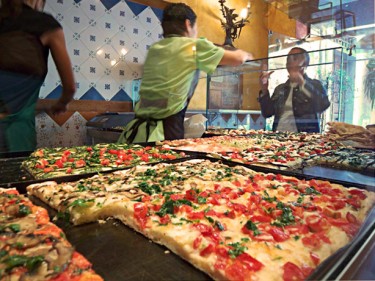A popular Domino's Pizza [1] marketing strategy promising pizza delivery within 30 minutes of an order has met with a public backlash in South Korea, following the deaths of several young delivery personnel.
The Young Union, the union For Occupational and Environmental Health (FOEC) and several labor unions held a press conference on 8 February, 2011, in front of Domino's Pizza’s headquarters in South Korean capital Seoul, pressuring the company to abolish the '30 Minute’ delivery system.
 [2]
[2]South Koreans are discovering the hidden cost of their takeaway pizzas. Image in public domain via Wikimedia.
The issue gathered huge media attention in December, 2010, when a 24 year old part-time delivery boy died in a car accident whilst delivering an order [3] [ko]. Three more people from the same brand have died in similar circumstances last year alone.
According to the Korean Ministry of Employment and Labor, more than 7,000 thousand delivery-related motorbike accidents are recorded per year. Several thousand people, including a celebrity author, famous actress and several academics have officially expressed concern over the '30 Minute’ system; it pressurises delivery personnel to drive fast and dangerously, as they are given penalties or forced to pay for the cost of the order when the 30 minutes delivery deadline is not met.
The '30 Minute Guarantee’ was originally introduced by Domino's Pizza in the United States in 1973 [4], but was eventually dropped after several lawsuits related to dangerous driving associated with the policy.
Hostile Working Conditions
When most big pizza brands receive complaints about slow delivery, they give away a free pizza or a discount. In the case of Domino's South Korea, when 30 minutes have passed since an order, customers get a 2,000 Won (around 2 USD) discount for each pizza. After 45 minutes, customers get a free pizza or free side dish.
What aggravates the already hostile working conditions delivery personnel experience in the country, are customers who hold their elevator or do not answer the door to postpone delivery in order to get a free pizza. Some customers demand delivery even on extremely snowy days, when many other pizza parlors do not accept take-out orders.
Gloria Gu, an intern researcher for FOEC writes on the page [5] dedicated to the '30 Minute’ issue on social networking site Facebook, “15 minutes is enough time to kill a innocent man”. It is believed that an average of 15 minutes are spent on making a pizza.
She encourages more people to join the social protest:
30분 배달제라는 청년노동자의 삶이 아직까지 자신의 일이 아니라며 외면하는 사람들도 많이 있을 것입니다. 기업의 경제논리 때문에 어쩔 수 없다고 치부해버리거나 폐지할 이유가 없다고 하는 사람도 있을 것입니다. 그렇지만 그 사람들의 관심까지 모아, 더 이상 무고한 희생이 일어나지 않도록, 모든 노동자들이 생명의 위협을 받지 않고 안전한 환경에서 일할 수 있도록 끝까지 함께해주십시오.
Below her article, comments such as these were posted:
권용진 [6] 신호를 위반하고 배달하는 이들을 안좋은 시선으로 바라보았었는데… 그게 아니군요. 참 안타까운 일입니다.
Dam Juck [7] 항상 빨리 안온다고 불평만 했었는데 이글을 보니 참 바보같은 짓을 했었군요.
Kwon Yong-jin: I used to have a slanted view of those who deliver [food] whilst ignoring traffic signals. But that [referring to his view] was not right. It's such a regrettable situation.
Dam Juck: I always complained about the delivery being not fast enough, but after reading these [Facebook] articles, I now realize I have acted like an idiot.
Korean net users filed an online petition [8] on the Daum Agora website, which has already gathered 1,000 signatures. The petition points out that the '30 Minute’ system has to stop immediately for the sake of public justice and safety:
30분 배달제로 아르바이트 하는 청소년들이 안따갑게 배달사고로 목숨을 잃고있다. 영리를 목적으로 지나친 업체경쟁으로 목숨을 요구하는 부도덕한 상술이다. 과연. 알바생의 목숨을 요구해야 할 만큼 부도덕한 사회가 되었단 말인가?![…]또한 운전자 입장에서도 30분 배달제 인해 언제 배달원들이 목숨걸고 튀어나올지 몰라 불안한 상황이다. 한편 선진국에서 이런 영업행태가 적발되면 사법당국에서 살인미수죄로 처벌한다.
Blogger Bolin3 [9] suggests [ko] [9]that the delivery policy may have emerged as a result of the Korean ‘Palli-Palli‘ (‘faster faster’) corporate culture, which focuses solely on yielding quick, quantitative results:
얼마전에 등록금을 벌기 위해 피자 배달을 하던 한 대학생의 오토바이 사고 후 사망사고를 뉴스로 전해들었던 기억이 있습니다. 그냥 그랫나보다 좀 천천히 다니지…그랬죠.동네에서 폭력질주하는 오토바이들에 아이들이 몇 번 놀라서 대수롭지도 측은하지도 않게 넘겼나 봅니다. 그런데…그 질주에 이면에는 배달원들이 어쩔 수 없었던 불가항력적인 부분이 있었네요. 오늘날 대한민국이 있는데 한 몫을 했던 ‘빨리빨리'문화는 긍적적이고 하지만…그것이 우리도 모르는 사이에 고객만족이라는 이름을 달고 누군가에게 위압적이고 위험을 줄 수 있다는 생각을 가져봅니다.